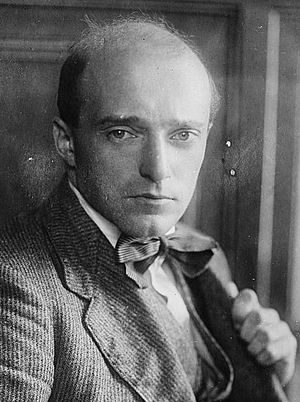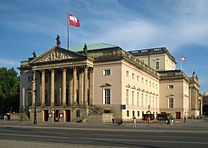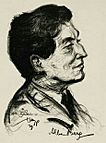Erich Kleiber facts for kids
Quick facts for kids
Erich Kleiber
|
|
|---|---|

Kleiber in 1930
|
|
| Born | 5 August 1890 Vienna, Austria
|
| Died | January 27, 1956 (aged 65) |
| Alma mater | Prague Conservatory |
| Occupation | conductor |
| Children | Carlos Kleiber (son) |
Erich Kleiber (born August 5, 1890 – died January 27, 1956) was a famous conductor. He was born in Austria and later became a citizen of Argentina. He was well-known for performing classic music by composers like Mozart and Beethoven. He also strongly supported new music from his time.
Kleiber started his career in opera houses, which was a common path for conductors back then. He began by helping singers learn their parts, then moved on to conducting. He worked in several German cities like Darmstadt and Düsseldorf. In 1923, he got a very important job as the music director of the Berlin State Opera.
In Berlin, Kleiber became very respected for his careful music skills and for choosing exciting new pieces to perform. However, when the Nazi Party came to power in Germany in 1933, he disagreed with their strict rules. He resigned from his job as a protest and left the country. He and his family moved to Buenos Aires, Argentina. After that, he traveled the world as a guest conductor, leading orchestras in many different opera houses and concert halls. He helped a lot with the creation of the Royal Opera in London. Later, he planned to return to the Berlin State Opera in the 1950s, but political problems stopped him.
Erich Kleiber was seen as an amazing conductor of music by Mozart, Beethoven, and Richard Strauss. He also encouraged modern composers, like Alban Berg. Kleiber even conducted the very first performance of Berg's opera Wozzeck. He passed away suddenly in Zurich when he was 65 years old.
Contents
Life and Career
Early Years and Training
Erich Kleiber was born in Wieden, Vienna, Austria, on August 5, 1890. His father was a teacher, and his mother's name was Vroni. Sadly, both of his parents died when he was very young. Erich and his sister went to live with their grandparents in Prague.
In 1900, after his grandfather died, Kleiber returned to Vienna. He lived with an aunt and went to a high school. He loved going to music performances, especially at the Hofoper, where the famous Gustav Mahler was the music director. One day, after hearing Mahler conduct his own Sixth Symphony, Kleiber told his friend that he wanted to become a conductor. His friend pointed out that most conductors started by being a répétiteur (a coach who helps opera singers learn their roles) in an opera house. The problem was, Kleiber had never learned to play the piano!
In 1908, Kleiber moved to Prague to study art and philosophy at Charles University. He also applied to the Prague Conservatory for music. He was accepted, but only if he could quickly learn to play the piano and meet the school's standards. So, he bought a piano and taught himself! He also took organ lessons and worked hard to pass his exams.
In 1911, he got a job as a coach at the Deutsches Theater in Prague. He also started working as an accompanist, playing piano for singers. A director from the Darmstadt Court Theatre saw how talented Kleiber was and invited him to conduct there. Kleiber worked in Darmstadt for seven years. After that, he got conducting jobs in other German cities like Barmen-Elberfeld (1919), Düsseldorf (1921), and Mannheim (1922).
Leading the Berlin State Opera
In 1923, the music director of the Berlin State Opera resigned. Other famous conductors were considered, but Kleiber was invited to conduct one performance of Fidelio. He made such a great impression that three days later, he was offered the job! He signed a five-year contract.
His years in Berlin were very busy and successful. He conducted many important operas, including Janáček's Jenůfa and the very first performance of Berg's Wozzeck in 1925. He also performed new works by other modern composers like Darius Milhaud.
In 1926, Kleiber married Ruth Goodrich from America. They had two children: Veronica and a son named Karl, who later became the famous conductor Carlos Kleiber.
During his time in Berlin, Kleiber also started conducting internationally. He led concerts in Buenos Aires, Moscow, and New York.
Kleiber's time in Berlin ended in 1934, a year after the Nazi Party took power in Germany. Even though Kleiber was not Jewish and wasn't involved in politics, he refused to accept the Nazis' unfair rules and their control over art. When Berg's new opera Lulu was banned by the Nazis as Entartete Musik (meaning "degenerate music" or "bad art"), Kleiber resigned from his job at the State Opera. He was very upset when his close friend Berg thought he might join the Nazi Party to protect his career. Kleiber wrote to Berg, "I was never a member of the NSDAP – and never had any intention of becoming one!!!"
To show his disapproval of the Nazi government, Kleiber included a special part of the banned Lulu opera in his last concert in Nazi Germany. This event got a lot of attention around the world. The New York Times reported that the audience cheered loudly for Kleiber and the orchestra. After finishing his last scheduled opera performances, Kleiber left Germany with his family in January 1935.
Living as an Emigrant
From 1935 to 1939, Kleiber traveled a lot, conducting in many European cities like London, Amsterdam, and Brussels. In 1938, he conducted at Covent Garden in London for the first time.
In 1939, he canceled his contract with La Scala, a famous opera house in Milan, Italy. This was because Mussolini's government in Italy had also started unfair laws against Jewish people. Kleiber said:
During these years, Kleiber's main home was in Buenos Aires, Argentina. He became an Argentine citizen in 1936. He was in charge of the German opera seasons at the Teatro Colón in Buenos Aires from 1937 to 1949. He also conducted in other South American countries like Chile, Uruguay, Mexico, and Cuba.
After World War II
After World War II, Kleiber started conducting in Europe again. He worked with the London Philharmonic Orchestra in 1948 and at Covent Garden from 1950 to 1953. He played a very important role in helping the Covent Garden opera company grow and improve after the war.
Many people wanted Kleiber to be the music director at Covent Garden, but he didn't want to commit to one place because he had many offers from other orchestras in Europe. In 1951, he conducted a famous opera production in Florence, Italy, starring the legendary singer Maria Callas. There were also plans for him to work at the Vienna Staatsoper (Vienna State Opera), but they didn't happen.
Near the end of his career, Kleiber accepted an invitation to return to his old job at the Berlin Staatsoper. After the war, Berlin was divided, and the opera house was in East Berlin. The old building had been damaged by bombs and was being rebuilt. In 1951, the East German government asked Kleiber to be the music director when the building was finished. At that time, there was a lot of tension between the Soviet bloc (East Germany) and the Western countries. Some people thought Kleiber was wrong to work for the East German government. However, he felt he was helping to build bridges between East and West.
The opera house was supposed to reopen in 1955. But as the time got closer, Kleiber noticed that the government was interfering more and more with how the opera house was run. Things got worse when the authorities removed an old statue of Frederick the Great from the building. Kleiber wrote that he realized "the spirit of the old theatre cannot reign in the new building." He resigned before the reopening. He felt that the West Germans had also been unfair in trying to stop him from conducting in East Berlin, so he left the city and never went back.
Many believe that the disappointment over the Berlin Staatsoper was a big blow to Kleiber. He died suddenly in Zurich on January 27, 1956, at the age of 65.
Legacy and Recordings
Erich Kleiber is remembered as an amazing conductor of music by Mozart, Beethoven, and Richard Strauss. He was known for studying the music very carefully and performing it exactly as the composer intended, without adding his own overly dramatic interpretations. He always understood the whole piece of music and kept his performances serious and focused. Musicians and singers loved working with him.
Kleiber received several honors, including awards from Belgium, Italy, Peru, and Chile. He was also a composer himself, writing a Violin Concerto, a Piano Concerto, and other pieces for orchestra and chamber music.
Recordings
Kleiber made many recordings, especially for the Decca record company between 1948 and 1955. His recordings of Der Rosenkavalier, Le nozze di Figaro, and Beethoven's symphonies are famous for showing his amazing control over rhythm and how loud or soft the music was. Many of his recordings have been re-released today.
| Composer | Work | Orchestra | Date |
|---|---|---|---|
| Beethoven | Fidelio | Cologne Radio Symphony | 1956 |
| Beethoven | Symphony No. 3 | Vienna Philharmonic | 1953 |
| Beethoven | Symphony No. 3 | Concertgebouw | 1950 |
| Beethoven | Symphony No. 5 | Concertgebouw | 1953 |
| Beethoven | Symphony No. 6 | Concertgebouw | 1953 |
| Beethoven | Symphony No. 6 | London Philharmonic | 1948 |
| Beethoven | Symphony No. 7 | Concertgebouw | 1950 |
| Beethoven | Symphony No. 9 | Vienna Philharmonic | 1952 |
| Dvořák | Carnival Overture | London Philharmonic | 1948 |
| Handel | Berenice, Andante Larghetto | London Philharmonic | 1949 |
| Mozart | Le nozze di Figaro | Vienna Philharmonic | 1955 |
| Mozart | Symphony No. 39 | Cologne Radio Symphony Orchestra | 1956 |
| Mozart | Symphony No. 40 | London Philharmonic | 1949 |
| Mozart | Four German Dances | Cologne Radio Symphony Orchestra | 1956 |
| Schubert | Symphony No. 5 | North German Radio Symphony | 1953 |
| Schubert | Symphony No. 8 | Berlin Philharmonic | 1953 |
| Schubert | Symphony No. 9 | Cologne Radio Symphony | 1953 |
| Strauss, Johann II | Der Zigeunerbaron Overture | London Philharmonic | 1948 |
| Strauss, Josef | Sphären-Klänge | London Philharmonic | 1948 |
| Strauss, Richard | Till Eulenspiegel | North German Radio Symphony | 1951 |
| Strauss, Richard | Der Rosenkavalier | Vienna Philharmonic | 1954 |
| Tchaikovsky | Symphony No. 4 | Paris Conservatoire | 1949 |
| Tchaikovsky | Symphony No. 6 | Paris Conservatoire | 1953 |
| Various | "Orchestral showpieces" | Berlin Philharmonic | 1930–1934 |
| Various | Concert recordings | NBC Symphony | 1947–48 |
| Verdi | I vespri siciliani | Maggio Musicale Fiorentino | 1951 |
| Wagner | Tristan und Isolde | Teatro Colón | 1948 |
| Weber | Der Freischütz | Cologne Radio Symphony | 1955 |
| Weber | Symphony No. 1 | Cologne Radio Symphony Orchestra | 1956 |
Film Appearances
Erich Kleiber also appeared in some films, conducting orchestras.
| Composer | Work | Orchestra | Date | Label |
|---|---|---|---|---|
| Mozart | German Dances, K. 605, No. 3 | Berlin State Opera | 1931 | – |
| Strauss, Johann II | An der schönen, blauen Donau | Staatskapelle Berlin | 1932 | Teldec (1997) 0927.42668.2 |
| Novák, Vítězslav | South Bohemian Suite | Czech Philharmonic | c. 1949 | – |
| Strauss, Johann II | Künstlerleben | Staatskapelle Berlin | 1949 | – |
| Beethoven | Symphony No. 9 | Czech Philharmonic | 23 August 1949 | Hearst Metrotone News |
See also
 In Spanish: Erich Kleiber para niños
In Spanish: Erich Kleiber para niños
 | Sharif Bey |
 | Hale Woodruff |
 | Richmond Barthé |
 | Purvis Young |




